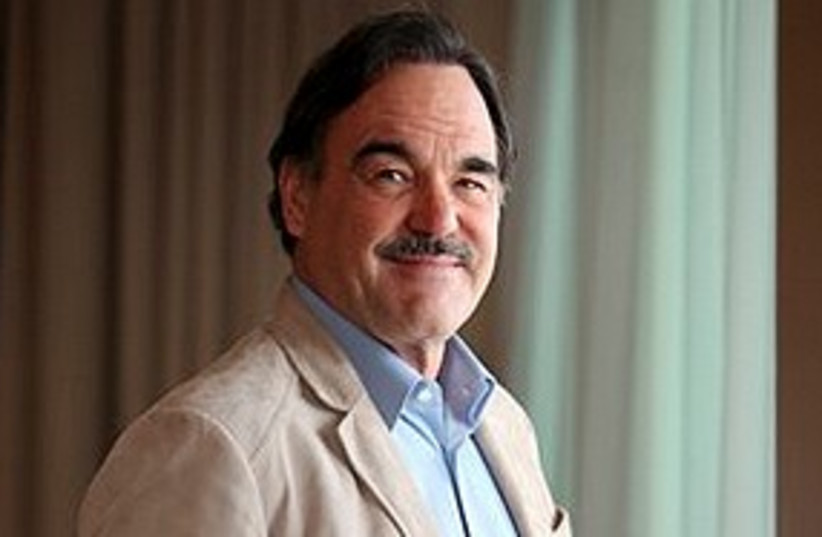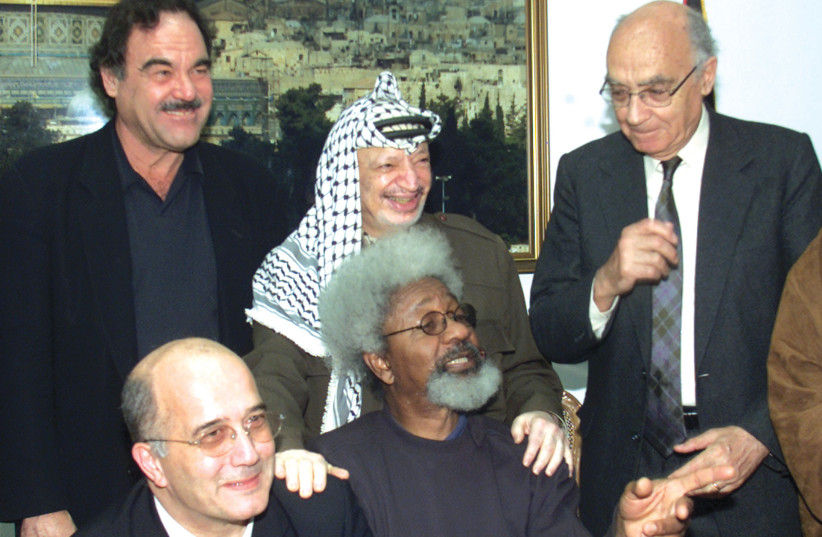Oliver Stone is in Jerusalem and he wants to talk about nuclear power.
Stone is in town to receive a lifetime achievement award at the 40th Jerusalem Film Festival opening which took place on Thursday, and on July 14 he will be present at a screening of his latest documentary, Nuclear Now.
Certainly, no one can challenge his reputation as one of America’s master filmmakers, although some have criticized the festival for its decision to honor him because of his politics, particularly concerning Russia and Ukraine, as well as statements he has made on Israel.
Stone, who was born in New York to a Jewish stockbroker father (the family’s original last name was Silverstein) and a French World War II bride mother, famously dropped out of Yale and enlisted to fight in the Vietnam War. He saw combat and was awarded a Bronze Star and a Purple Heart (among other honors).
His experiences in war inspired his screenplay for Platoon, a drama about a naïve young recruit fighting in Vietnam, which won the Best Picture Oscar in 1987 and for which Stone received a Best Director Oscar. In 1990, he won the Best Director Oscar again, this time for Born on the Fourth of July, a drama based on the life of Ron Kovic, a disabled veteran who became an anti-war activist.

For years, Stone alternated between war movies, including Salvador and Heaven & Earth, and movies critical of US life, among them Wall Street, in which Michael Douglas won an Oscar and uttered the iconic, “Greed is good” speech. He also made Natural Born Killers, an indictment of America’s worship of violence and the popularity of tabloid TV. In addition, he has had a stellar career as a screenwriter, writing Scarface and Midnight Express, for which he won an Oscar in 1979, among others.
Stone is now focusing on nuclear energy
But what’s on Stone’s mind is nuclear power and he is disappointed that I was not provided with the opportunity to see Nuclear Now before our meeting. The interview hangs in the balance for a moment, but I promise he will have time to talk about Nuclear Now after we speak about his early career.
I bring up his 2020 memoir, Chasing The Light, and mention that the first chapter in his book is called “Child of Divorce.” Was his parents’ divorce, which made him distrust authority figures, the defining event of his life?
“Yes, a lot. I’m thinking about it. People would always nail me and say, ‘Vietnam is your defining moment,’ and I say, ‘I’m not sure, you have to think about your life’” going back to childhood.
Asked whether he began by making war movies that criticized violence and then focused on what was wrong on the homefront, he said, “I wasn’t looking for things that were wrong, I was looking for drama. I’m a dramatist. And you can’t go about it like a journalist, saying, ‘Here are the problems of the world.’ I went about it with what’s exciting to me.”
He found a key drama that fascinated him in examining the story behind the JFK assassination, which he made into the 1991 feature film, JFK. Since then, he has made a few dramas – his last one was the 2016 Snowden, about the US whistleblower who exposed widespread surveillance in the National Security Agency – and many documentaries and docu-series for television. While some have expanded on conspiracy theories about the JFK assassination, others, particularly in recent years, have focused on Russia – he made a 2017 series featuring interviews with Russian President Vladmir Putin – and his sympathy for its government and foreign policy.
Asked about Persona Non Grata, a documentary film he made as part of the HBO series, America Undercover, which details his journey through the West Bank in the early 2000s and his unsuccessful attempt to interview former PLO chairman Yasser Arafat, he said, “He couldn’t quite trust me at first, but he kept me around.”
When Israeli tanks moved into Ramallah, Stone and his crew managed to get out, no thanks to the US government, which “didn’t do sh*t” to help. Asked whether he has been following current Israeli politics, in particular the anti-reform protests, he said, “It just goes on and on and on, this story, it was Ramallah then, Gaza, and now it’s Jenin.”
I wondered whether he feels he has a Jewish identity, and he replied, puzzled, “I was raised Protestant.”
Still, wasn’t his father a major influence in his life? “He had profound wisdom . . . he had anger and strength, he had those qualities, but he shied away from rabbis.”
Secular Zionism played no part in his upbringing, although, as he thought about it, he said, “I have this Jewish strength to some degree, and anger, and persistence, yeah, persistence is important.”

Some of this anger is in evidence when he talks about a subject he is passionate about, what he sees as the “warmongering” of various Democratic administrations, particularly when it comes to the Russia-Ukraine issue. Stone’s criticism of what he sees as the lingering “neoconservative” influence on US policy in Ukraine and Russia is very much on his mind as we talk.
Although he reviled Donald Trump, he couldn’t vote for Hillary Clinton, whom he thinks was a “bloodthirsty secretary of state,” and instead voted for Jill Stein.
“Basically [US officials] chose the [Ukrainian] government, they financed it.” It was the US, and not a popular uprising, that brought former president Petro Poroshenko to power, he said, repeating what he has stated in interview after interview.
He sees the massive outpouring of world support for Ukraine in its fight against Russia as a frightening return to Cold War politics. Current Ukrainian President Volodymyr Zelensky “is what he is, he’s a puppet,” Stone says, and then adds sarcastically, “Although I like that he’s demanding we go to war on his behalf, demanding nuclear weapons, demanding NATO.”
And now, Stone says, it’s really time to talk about nuclear power, which he sees as the best way to create clean energy and help control the climate change crisis.
“I’m scared about the future for my children and hopefully my grandchildren and I think the consciousness of the world is just more scared, more aware of heat waves.”
The Russians, he said, have a much better regulatory agency for nuclear energy than the Americans. But given his propensity to spot “the big lie” in anything the government says and does, does he really trust the US government to handle nuclear power safely? Surprisingly, he does. “When it comes to specialization, I think so, I mean I would trust the FDA to some degree, yeah.
“You can always be suspicious, but the government... but when it comes to the technical processes, they are pretty good, pretty good because there are standards, scientific standards... They stopped [developing nuclear energy] actually in the 80s after Three Mile Island, which they turned into a nightmare, which wasn’t, it wasn’t a nightmare...”
He continued: “I love Jane Fonda, but she was wrong.”
Then, urging me to attend the Nuclear Now screening, he headed to meet his wife for dinner.
The Jerusalem Post apologizes for an erroneous photo caption that appeared in an earlier version of this story.
